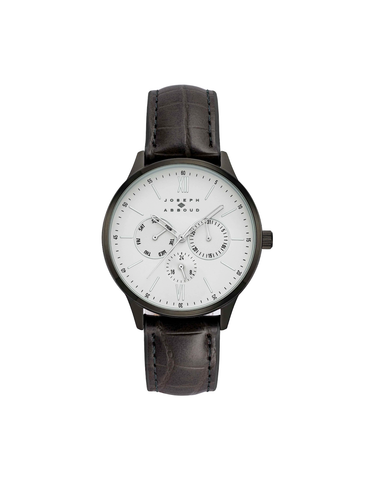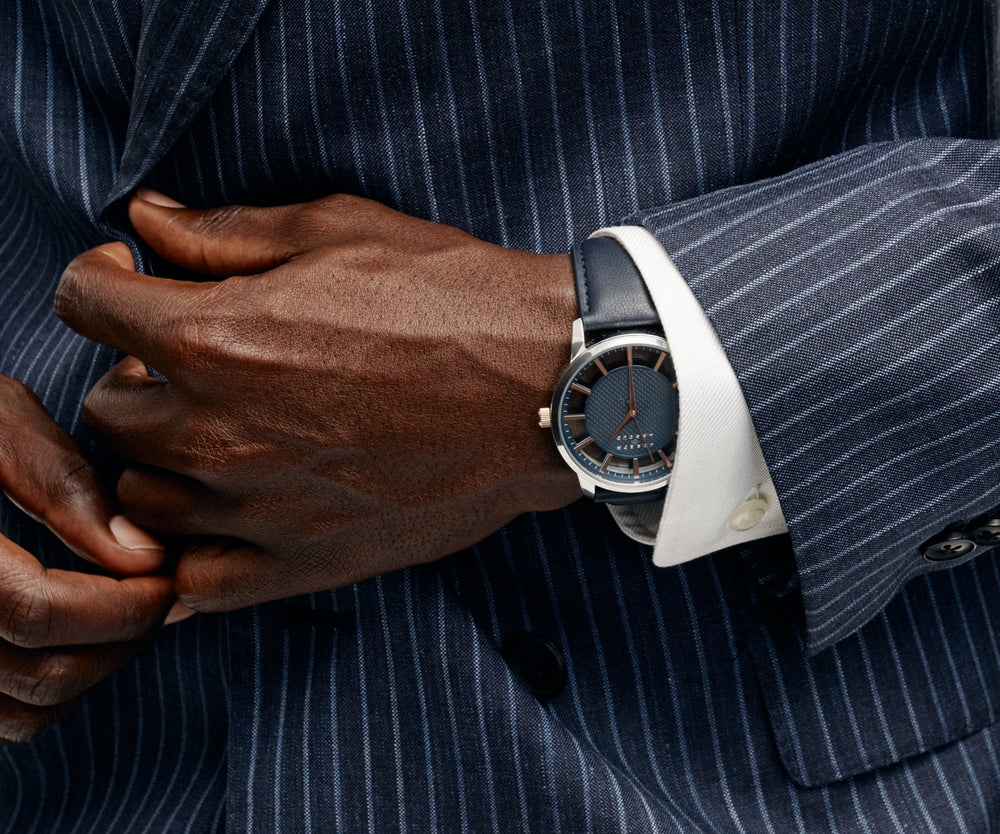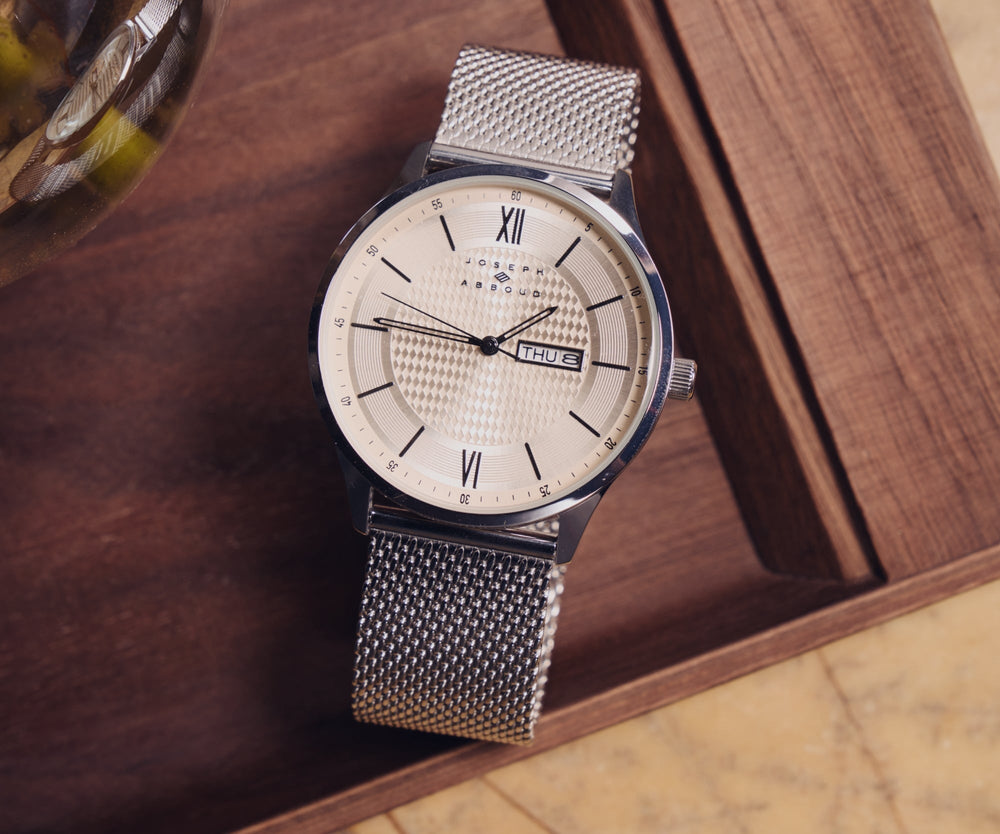How to Choose a Watch - Complete Guide - JosephAbboud.com
- by Off The Cuff
- |
- August 26, 2022
- |
- 5 min read
You’ve got the perfect bespoke suit. Your cologne is on point. You’ve even got on one of your favorite pairs of shades.
As stylish as you are, something is still missing.
You need a luxurious watch to bring your style game up to a 10.
Whether you’re a first-time buyer or looking for a new watch to add to your collection, choosing the right watch doesn’t need to be difficult.
If you’ve been wondering how to choose a watch that fits you like a glove, our guide can help. Below, we’ll highlight some of the aspects of men’s watches that you’ll want to consider when choosing your next (or first) watch.
First, let’s talk about setting a budget.
Buy According to Your Budget
Aside from being an incredible accessory for casual and formal outfits, one of the best things about men’s watches is that they can fit into any budget. Whether you want to spend $100 or $100,000, there’s a watch for you. What’s important is spending what you’re comfortable with.
There are many guidelines to aid watch buying, such as the “1% rule.” This advice says you should spend no more than 1% of your annual income on a watch. However, it's okay if you want to spend far less or far more than that. Spend what you are comfortable with and choose a watch that makes you feel confident.
In general, luxury watches tend to cost more because they utilize metals like platinum and gold. These watches are considered more of an investment than an accessory. For example, a Platinum Day-Date Rolex with a meteorite dial will set you back around $74,200. This kind of price tag can be prohibitive for first-time watch buyers.
Fortunately, there are still cost-effective options for men who want to look stylish on any budget.
Choosing Your First Watch
Once you’ve determined your budget for a watch (or a small collection of watches), it’s time to choose one that makes you look good.
There are several aspects of men’s watches that you’ll want to take into consideration. Here are some that impact price the most.
Watch Movements
Figuring out how to choose a watch starts with understanding the different types of watch movements. This is how the hands on the face of the watch move and allow you to tell the time.
You can choose from three types of watch movements: mechanical, quartz, and automatic.
Mechanical watches tend to carry the highest price tag since they’re the most traditional of the three. When you think of a high-end watch collector, they’re typically seeking out timeless and classic mechanical watches. These watches require manual winding every day for them to function properly.
Quartz watches are the most cost-friendly option of the three movements. They use a small battery for power, and they get their name from the piece of quartz inside the watch that regulates current and power. They’re also low maintenance and can be more durable without the risks associated with intricate moving parts.
Automatic watches function similarly to mechanical watches. However, they don’t require daily winding—instead, they use kinetic energy from the movement of your wrist to wind the watch. These watches offer many of the same intricacies sought after by watch collectors without the need for daily winding.
Watch Materials
The next aspect of choosing a watch is the watch material. Most watches are made using anything from precious metals to ceramics.
Some materials are more costly than others but may have drawbacks beyond price. For example, gold watches are considered classic luxury watches—they’re statement pieces that provide elegance to any outfit. However, real gold is not a durable material; it’s highly susceptible to surface scratches and is often mixed with metals that provide additional strength.
Compare this to a stainless steel watch: steel is much more affordable while still providing a luxurious look—as long as you shop around and pick the right one. Stainless steel watches do a fantastic job replicating the look of luxury metals like white gold or platinum.
The budget you determined earlier will influence your watch material. For a first-time buyer, we recommend a simple stainless steel or ceramic watch. These materials won’t break the bank and still provide a timeless accessory for casual and formal wear.
Watch Straps
Strap material is another important aspect of a watch that lets you show off your individual style.
In general, you have three primary strap materials for watches:
- Metal
- Leather
- Fabric

Leather bands are a classic choice—they’re the most common type of watch band with a vintage or classic feel. In general, a leather band will also be more comfortable than a metal band.
Leather bands come in a variety of diverse styles, from smooth to embossed. Some watch bands even feature special leather patterns, such as the classy crocodile-grain pattern in this Multi-Function Croco-Grain Strap Watch from Joseph Abboud:

Lastly, we turn to fabric watch bands. These bands offer a low-maintenance option that is also water-resistant and highly durable. However, they’re best worn with a casual outfit.
You can’t go wrong with a leather band if you want sheer versatility: they work with a suit or with a simple tee and jeans. A metal band is right for you if you want a statement piece—you’ll be turning heads everywhere you go.
If you want to start an amazing collection (and your budget allows it), you can even start with both. This will provide you with a diverse range of options from the office to the golf course.
Watch Complications
When we’re talking about watches, complications refer to anything inside the watch face that provides valuable information—other than the time.
Some common complications include:
- Alarms
- Different time zones
- Moon phases
- Date
- Power reserve indicators
This might sound like a small nuance, but it can be quite useful and have a direct impact on the price.
For example, a frequent traveler may want to have a watch that displays smaller dials in the background with information on different time zones. Meanwhile, the date would likely be a useful complication for just about anyone.
Our Brown & Gold Multi-Function Croco-Grain Strap Watch is a great example of how watch complications can add to a watch rather than detract. Complications for the day, date, and 24-hour time provide helpful details with a dash of style.

Complications might not be the first thing you look at when choosing a watch, but they’re worth considering once you’ve settled on everything else.
Watch Size
Watches come in many different shapes and sizes. Although it’s totally up to you, we recommend choosing a watch face size that fits your wrist appropriately. If it’s too large, it will look oversized and bulky. If it’s too small, a watch can clash with your outfit.
As a rule of thumb, a case size between 35mm and 50mm should fit most men perfectly. It’s best to try on a watch first and make sure that it fits your wrist nicely—or at least try a similarly-sized watch if you’re ordering online.
Shop Joseph Abboud’s Collection of Amazing Men’s Watches
If you’re in the market for a new watch, or want to begin your collection with your very first watch, there’s no better place to start than right here.
Our collection of stylish watches includes pieces that work for any outfit, whether you’re in a bespoke suit or dressed down for a casual night out. Find your perfect timepiece today with Joseph Abboud.











